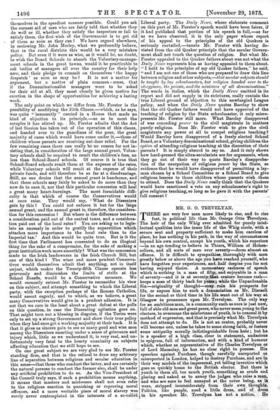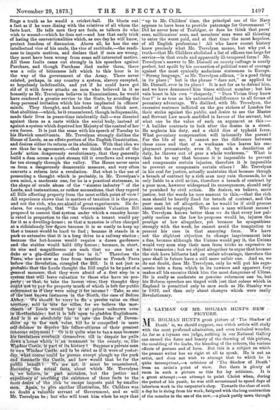MR. G. 0. TREVELYAN.
THERE are very few men more likely to rise, and to rise fast, in political life than Mr. George Otto Trevelyan. The heir of the only Whig ever admitted for purely intel- lectual qualities into the inner life of the Whig circle, with a secure seat and property sufficient to make him careless of place, he has nothing in his path, in the way of circumstances beyond his own control, except his youth, which his superiors —in an age tending to believe in Thiers, William of Hohen- zollern, and all sorts of men over seventy—deem almost an offence. It is difficult to sympathise, thoroughly with men greatly below or above the age you have reached yourself, who have forgotten your experiences, and half despise you for not having enjoyed theirs. A momentary rashness of speech which is nothing in a man of fifty, and enjoyable in a man of seventy—and it is at seventy that- orators become rash— keeps a man of thirty back for yenta; while the Unpardonable Sin—originality of thought—may ruin his prospects for life, or expose him to such a denunciation as Mr. Disraeli for the second or third time in his life went out of his way at Glasgow to pronounce upon Mr. Trevelyan. The only way for an ambitious man, in a community such as ours is just now, full of able old men and great peers, who never seem young to the electors, to overcome the misfortune of youth, is to conceal it by method of expression, and that is precisely what Mr. Trevelyan does not attempt to do. He is not an orator, probably never will become one, unless he takes to some strong faith, or fosters some antipathy morally indistinguishable from hate ; but he is a speaker of a high class, clear in statement, audacious in epigram, full of information, and with a kind of humour which, whether as representative of Sir Charles Trevelyan or of Lord Macaulay, he has no clear right to possess. His speeches against Purchase, though carefully unreported or misreported in London, helped to destroy Purchase, and are in their way models of the impersonal, yet telling invective which goes so quickly home to the British elector. But there is youth in them all, too much youth, something so crude and glaring and naked as to annoy the judges who raise a man, and who are sure to feel annoyed at the cover being, as it were, stripped inconsiderately from their own thoughts. Politics, like people, need a little dress, and of dress in his speeches Mr. Trevelyan has not a notion. He flings a truth as he would a cricket-ball. He blurts out a fact as if he were dining with the relatives of all whom the facts hurt. He tells men they are fools, as talkers do who wish to wound—which he does not—and has that early trick of hating the conventionalities which, as one day he will know, protect freedom of discussion. Above all, he has the one intellectual vice of his uncle, the vice of rectitude,—the readi- ness to impute motives, and declare that if men are wrong, they must have been wrong from some self-interested motive. All these faults came out strongly in his speeches against Purchase, and though Purchase died under them, there was a relic of bitterness left which to this hour is in the way of the government of the Army. There never existed, perhaps, in any country a system, slavery excepted, so hopelessly indefensible, and yet if he could have got rid of it with fewer attacks on men who believed in it as honestly as Mr. Trevelyan believes in Examinations, he would have rendered a greater service to the State, by avoiding the deep personal irritation which his tone implanted in officers' minds. They thought, and hundreds of them think now, that abolition—which, be it remembered, though indispensable, made their lives in peace-time intolerably dull—was directed against them as a caste within the social body, instead of against a system which deprived her Majesty of the control of her own forces. It is just the same with his speech of Tuesday to his Hawick constituents. Mr. Trevelyan strongly dislikes the House of Lords, as an effete portion of the English Constitution, and desires either its reform or its abolition. With that idea we are thus far in agreement,—that we think the result of the Lords' action dangerously revolutionary, that they generally build a dam across a quiet stream till it overflows and sweeps far too strongly through the valley. The House never saves us. from a dangerously democratic measure, and very often converts a reform into a revolution. But what is the use of presenting a thought which is probably, in Mr. Trevelyan's awn.mind, a moderate one, for he is a practical statesman, in the shape of crude -abuse of the "sinister industry. of- the Lords, and.insinuations, or -rather accusations, that-they regard all Bills affecting property from the most selfish point of view? All experience shows that in matters of taxation it is the poor, and not the rich, who are.af,raitiof ,great experiments. He de- clares, for example, that ' the Governihent Valuation Bill proposed to correct tbafeystem. under which a conntigy-hottee is.rated in proportion to the rent which >a tenant would pay for it as a dwelling-housec so that a Mansion is >often., charged' at.a ridicidously low figure because- it is so costly to keep that a tenant. would be hard to find ;' because it stands in ar park so extensive that it 'is -a long -drive to a railway station';; because the hot-honses would require a dozen gardeners and-the 'stables would- hold=fifty horses ; because, in short, its size and magnificence `are such that no one but a duke or a gin-distiller could live in it." Therefore the Peers, who are now as free -from• taxation as French Peers before the Revoltition, strangled the- Bill. Is it not just as Vrobablelthat thiPLortls thought the Bill' ought te be'part of a general measure;tetat they Were afraid' of a first step. hi a system- that will'iteave valuation to those who have'' ilo,pro- piilef FA* ctliat,tifICI 'bike the lowest -view; they thought ,they ilitihil?ilIftafticitaribr property much of which is left for public eiliSylignfEitrs ifitheywere using it for inhonitd? Take, as one kt s iti■chfiti instance's ti the Nortli;th'e ease of Bolton .1E613eYJn°Wirilihould be "lorryto fix a preeige value on ',that tdifilditi bold irfLbits for for we believe the 'Yaer- . `4of LeedAlWotild- btfy it at prices unknown 'tien 1''l fordshire"; 4:ititit 3% left open" to glattileit Engliehthen. And 'is it so alkkutely fair- to ratel'tthe Duke' of Devon- Aire up to thicinek void till he is compelled in 'mere self-defenceij deprive hiefellow-citiens of their greatest
innoceet' Et $'"Qr -quite' wise to taxa man because
Selves; till in' deSpair - pttlls 1%1'4 nbraement to the county, or, like W. rt., to history ? Siippose a private men aitcd to be rated as if it were of yestei;; rEle pursue except plough up the park Clistle, and how would that be for the igmilWe are not, it must be remembered, e itCian1 facts, about which. Mr. 'rrevelyan 34vriS 'He,. in part Mistaken, but the justice and th8 existence of those fach to the mute dettie rich to escape imposts paid by an:miler men. Alain, to 'live another illustration, Mr. Childers was no doubt a valuable servant of Government, and so will Mr. Trevelyan be ; but who will trust him when he says that "up to Mr. Childers' time, the principal use of the Navy appears to have been to provide patronage for Government " I Did he never hear of Trafalgar, or does he think that peers' sons, millionaires' sons, and members' sons were all thirsting to enter the worst paid, and at that time the most hopeless, of all English professions ? All who know recent history know precisely what Mr. Trevelyan means, but why put a truth—that Mr. Childers abolished a list of officers too large for service—in that crude and apparently ill-tempered form? Mr. Trevelyan's answer to Mr. Disraeli on county suffrage is nearly perfect, but spoilt by his accusation of political want of courage against the most cynically audacious statesman in Europe. " Strong language," as Mr. Trevelyan affirms, " is a good thing in its place ;" but is the phrase " dare not," as applied to Mr. Disraeli, ever in its place ? It is not for us to defend him, and we have denounced him times without number ; but his vain boast in his own "rhapsody," " Does Vivian Grey know fear I" is as true as his unboasted indifference to all forms of pecuniary advantage. We disliked, with Mr. Trevelyan, the excessive sentence inflicted' on the gas stokers of London for their strike against the public, and desire to see the Master and Servant Law much modified in favour of the servant, but what can be the value of such an argument as this :— " A builder contracts to look after the drains in a street. He neglects his duty, and a child dies of typhoid fever. What pecuniary compensation will indemnify the parent? For the life of me, I cannot see the difference between these cases and that of a workman who leaves his em- ployment prematurely, even if, by such a dereliction of duty, he throws out of gear a whole workroom." What is that but to say that because it is impossible to prevent and compensate certain injuries, therefore it is impossible to prevent or compensate certain others I Mr. Trevelyan in his zeal for justice, actually maintains that because though a breach of contract by a rich man may ruin thousands, he is only liable to a civil action, therefore a breach of contract by a poor man, however widespread its consequences, should only be punished by civil action. He desires, we believe, mere justice, but the words he uses- amount to this,—that the rich man should be heavily fined for breach of contract, and the poor man let off altogether, as .he would be if civil process alone could be employed. Who sues a man without means ? 'Mr. Trevelyan knows better than we do that every law pal- pably useless as the law he proposes would be, injures the .prestige of law altogether, yet because he sympathises 'strongly with the weak, he cannot avoid the temptation to (present his case in that annoying form. We have not the slightest objection to change imprisonment into a fine, because although the Unions would pay it, the Unions would very soon stop their men from tricks so expensive to their treasuries ; but we object altogether to argue that because the rich have hitherto had an unfair advantage, therefore the poor shall in future have a still more unfair one. And so, we do not doubt, does• Mr. Trevelyan, only he will put his argu- ments into a form which in its rawness, and apparent fury makes'all his enemies think him the most dangerous of Ultras. He is really as moderate as genuine reformers• ran be, but his Reform speeches are tinged with just that colour which in England is permitted only to men such as Mr. Stanley was in 188g, and •then only about changes which were really Revolutionary.







































 Previous page
Previous page